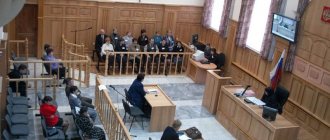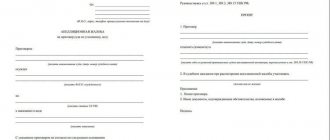Grounds for holding a preliminary hearing in criminal proceedings and the timing of its appointment
The norms of Part 2 of Art. 229 of the Code of Criminal Procedure of the Russian Federation defines the grounds for holding a preliminary hearing:
- petition of the parties to join criminal cases (cases are joined under Article 139.2 and 153 of the Criminal Procedure Code of the Russian Federation);
- the basis for separating a criminal case (a case is segregated under Article 139.1 of the Code);
- a sentence that has not entered into force if the person against whom a new criminal case has been filed has a suspended sentence for a crime he committed in the past;
- settlement of nuances in the consideration of a criminal case (CD) by a court with a jury;
- petition of the party to carry out proceedings in court under Part 5 of Art. 247;
- grounds for suspension or termination of the case (they are provided for in Articles 238 - 239);
- grounds for returning the case to the prosecutor (under Article 237 of the Code);
- a request of a party that excludes any evidence when it is stated under Part 3 of Art. 229.
At least one such ground must be present for a preliminary hearing to be held.
The deadline for scheduling a preliminary hearing in a criminal case is specified in Part 3 of Art. 227 Code of Criminal Procedure of the Russian Federation. According to this norm, it amounts to a maximum:
- 30 days from the date of receipt of the UD by the court - in the usual manner;
- 14 days from the date of such receipt - in cases where the accused are kept in custody.
According to Part 4 of Art. 227 of the Code of Criminal Procedure of the Russian Federation, copies of the judge’s decision that sets the hearing are sent to:
- to the prosecutor;
- to the victim;
- to the accused.
Features of the procedure
If the court decides to exclude evidence, it loses its legal significance. Accordingly, it cannot serve as a basis for passing a sentence or other act, or be examined and used in the process.
If a jury is serving, no one may inform them of the existence of evidence excluded during the preliminary hearing of a criminal case. Meanwhile, the legislation contains a rule according to which during the trial the court has the right to assess the admissibility of excluded evidence.
The procedure for conducting a preliminary hearing in criminal proceedings
Based on Art. 234 of the Code of Criminal Procedure of the Russian Federation, a preliminary hearing in a criminal case takes place in the following mode.
The parties call by notice, which must be sent in advance - at least three days before the date of the preliminary hearing. The accused may be absent if a corresponding petition is sent on his behalf or on behalf of one of the parties. If other participants notified on time do not appear at the hearing, it will not be postponed and will take place without them.
In case of an exclusive evidentiary request of the party, which is submitted within the framework of Art. 235 of the Code of Criminal Procedure of the Russian Federation, the judge determines whether there are any objections. If there are none, such a request is granted. Then a court hearing is scheduled.
A request for additional evidence or items submitted by the defense will be granted if these additions are valuable to the case.
Those who know anything about the investigative actions carried out, the seizure and inclusion of documents in the criminal record, can (at the request of the parties) be questioned as witnesses. Only holders of witness immunity are not interrogated in this regime (clause 40 of Article 5 of the Code).
Minutes are taken during the hearing.
Nuances
Issues relating to the selection or extension of a preventive measure are resolved at the request of the prosecutor or at the initiative of the court with the participation of the accused, a lawyer or his other representative, the prosecutor in a court hearing or at a preliminary hearing.
Participants are notified of the date, time, and place of the hearing no less than 3 days before its start.
Uncertainty of the Code of Criminal Procedure
The Code does not establish a clear definition of violations that may be committed when drawing up a conclusion or an act of accusation. The Code of Criminal Procedure does not provide for criteria by which one can judge whether the court has the opportunity to make a decision or does not have it. In this regard, quite often in practice there are disputes about the legality of decisions made on the return/non-return of materials to prosecutors. Explanations were given at the time by the Constitutional Court and the Supreme Court. The first, in particular, in the Resolution of December 8, 2003, noted that the provisions of Art. 237, part 1 of the Code of Criminal Procedure does not exclude the power of courts on their own initiative or in accordance with a party’s request to return materials to the prosecutor if, during pre-trial proceedings, there were significant violations of the law that cannot be eliminated during the proceedings, if such a decision is not related to the completion of the preliminary investigation or inquiry. More specific explanations were given by the Plenum of the Supreme Court in the Resolution of March 5, 2004. In particular, the Supreme Court indicated that non-compliance with the provisions of Art. 220, 225 of the Code of Criminal Procedure, excluding the possibility of making a decision on the merits in accordance with the document. The latter, in particular, occurs when:
- The absence in the document of indications of the subject’s previous criminal records, data on his whereabouts, information about the victim (if identified), etc.
- Inconsistency between the charges set out in the conclusion/act and those present in the decision to charge the person as an accused.
- Absence of the signature of the inquiry officer/investigator, the stamp of approval of the prosecutor.
Taking into account the above, we can conclude that a preliminary hearing in criminal proceedings is appointed if there are violations in the drawn up indictment/conclusion, if:
- They are significant.
- Prevent the court from making a decision.
- Eliminating their consequences is not associated with making the investigation or inquiry complete.
- A copy of the report/conclusion was not served on the accused.
- Elimination of consequences does not require time expenditure exceeding 5 days.
The purpose of returning materials to the prosecutor if a copy of the report was not served on the accused is quite clear. The official is obliged to ensure the execution of the investigative action, which serves as one of the key procedural means that guarantees the subject’s exercise of his right to defense. However, the court itself cannot correct this violation. This is due to the presence of a general requirement that the authority does not have the right to take any actions that cast doubt on his involvement with the prosecution.
Suspension or termination of production
The procedure for a preliminary hearing in a criminal trial in this case is prescribed in the presence of circumstances similar to those that guide the inquiry officers/investigators during the investigation. However, there are two significant differences. In the list of circumstances that a judge may be guided by when scheduling a preliminary hearing in criminal proceedings, there is no provision specified in Art. 208 part 1 clause 1 of the Code of Criminal Procedure – “failure to identify the subject who is subject to prosecution as an accused.” This is quite justified, since the authorities cannot receive materials for which the perpetrator has not been identified. At the same time, the list of grounds is supplemented by a condition under which the court can suspend proceedings if a request is sent to the Constitutional Court regarding the constitutionality of the law to be applied when considering the materials. Another circumstance is the acceptance of a complaint from any party to the proceedings. In it, the participant in the process must indicate a violation of his constitutional rights as a result of the application or possible application of a norm that is not consistent with the Basic Law of the Russian Federation.
Exceptions
During the preliminary hearing, the court cannot decide to dismiss the case if circumstances have been identified that indicate the existence of rehabilitative grounds for closing the proceedings or ending the prosecution. In this case, production is carried out according to general rules. If the discovered exonerating circumstances are confirmed, the court issues an acquittal. During the preliminary hearing, additional grounds may be identified that oblige a decision to terminate the proceedings. This is the prosecutor's refusal to bring charges. In this case, the rules specified in Art. 246 part 7 of the Code of Criminal Procedure.
Return of materials to the prosecutor
An appropriate decision based on the results of the hearing is adopted to remove obstacles to the consideration of the case if:
- The indictment (conclusion) was drawn up in violation of the provisions of Articles 220, 226.7, 225 of the Code of Criminal Procedure, which excludes the possibility of the court making a reasoned and lawful decision.
- Copies of documents related to the proceedings were not provided to the accused. The exception is cases when the citizen himself refused to receive them.
- There are grounds for merging the cases.
- The accused was not explained his rights, enshrined in Part 5 of Article 217, when familiarizing himself with the materials of the proceedings.
- The facts reflected in the indictment, or established as part of a preliminary hearing or trial, indicate the existence of grounds for changing the classification of the act of the accused or the subject against whom proceedings have been initiated to apply compulsory medical measures to a more serious assault.
- Circumstances have been identified that preclude an inquiry in an abbreviated form. In this case, the judge is obliged to return the case to the prosecutor for further transfer of jurisdiction and conduct an inquiry according to the general rules.
- After the court received the materials, new consequences of the act committed by the accused arose, as a result of which grounds arose for bringing charges of a more serious assault.
- A court decision previously made in the case has been cancelled, and newly discovered or new circumstances that have become the basis for its cancellation are the reason for filing charges of a more serious crime.
If the case is returned to the prosecutor, the judge is obliged to decide the issue regarding the choice of a preventive measure against the accused.
Hearing decisions
The progress of the meeting must be reflected in the minutes. At the end of the hearing, the judge must make a decision. It is formalized by an appropriate resolution (definition). The court may, in particular, decide on:
- Suspension/termination of a criminal case at a preliminary hearing.
- Appointment of a meeting.
- Direction of materials according to jurisdiction.
- Postponement of the meeting. Such a decision is made if it is revealed that a sentence has already been passed against the accused, providing for criminal punishment, but has not entered into force.
- Separation of the case into independent proceedings or the impossibility of this.
- Returning materials to the prosecutor.
The decision made by the judge must reflect the results of the considered petitions and complaints. It also indicates the specific evidence that was excluded, and which materials, in this regard, should not be examined and disclosed at the meeting, used in proof.
Legal requirements
When returning materials to the prosecutor, a number of provisions must be taken into account. They must be observed regardless of what circumstances served as the reason for returning the case to the prosecutor. The legislation requires the following:
- The question of choosing a preventive measure for the accused, the materials on the crime of which are returned to the prosecutor, is decided by the judge.
- Evidence obtained to correct violations that were committed during the preparation of the indictment/conclusion, if it took more than 5 days, is a priori considered unacceptable.
Explanations of the RF Armed Forces
In the Resolution of October 31, 1995, the Plenum indicated that, firstly, the court’s request must be made in writing. Secondly, the document must provide the exact name, date of adoption, number, source of publication and other data about the legislative act to be verified. In addition, the court in its request indicates the reasons for which the decision to send the application was made. Also in this Resolution, the Supreme Court recommended that the authorities simultaneously change the measure of restraint for the accused if he was in custody at that moment. This is a fairly important note, since consideration of requests by the Constitutional Court takes a significant period of time.






